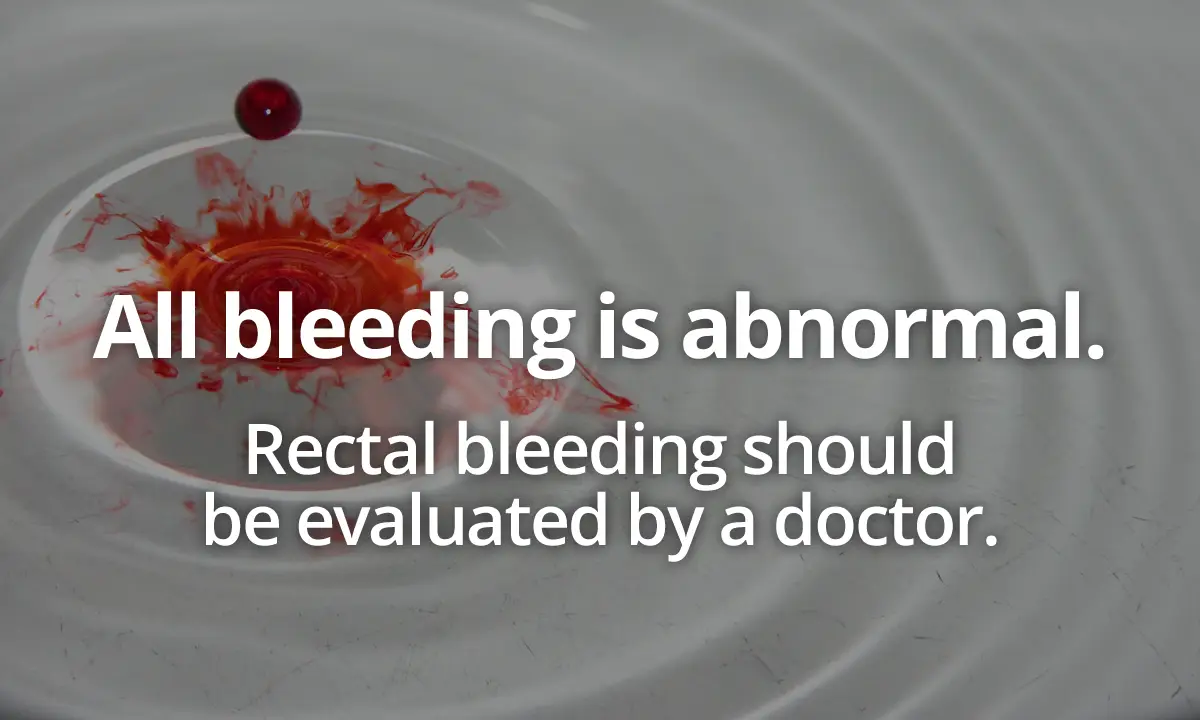When we see blood, it can trigger an alarm that something is wrong. You’re experiencing rectal bleeding if you notice a small amount of red to black blood in the toilet bowl, on the toilet paper, or in your stool after a bowel movement. Sometimes, blood from the rectum will pass on its own (without a bowel movement).
If you notice blood in the toilet bowl, it can look like a much more significant amount of blood than it actually is. This is because when blood spreads in water, it has the appearance of a larger quantity of blood than it actually is.
It’s important to keep in mind that rectal bleeding can indicate a serious medical issue. However, rectal bleeding most often is due to a less severe condition like hemorrhoids.
For those that have experienced this bleeding, I wanted to share this list of frequently asked questions I receive from my patients. I hope this Q&A helps you better understand the causes and recommendations your doctor may make for diagnosis/treatment.

Rectal Bleeding FAQs
When do I need to see a doctor?
Since all bleeding is abnormal, a medical professional should evaluate everyone experiencing rectal bleeding to ensure that the bleeding is not a sign of a serious medical issue.
Seek immediate medical attention if you have significant bleeding and are experiencing any signs of shock, if the bleeding is continuous or heavy or if the bleeding is accompanied by severe abdominal pain.
What type of doctor treats rectal bleeding?
A gastroenterologist or a colorectal surgeon usually manages this condition. Gastroenterologists have special training in treating all digestive symptoms. This knowledge helps us find the root cause of your symptom, diagnose your condition and suggest the best treatment regimen to get you feeling better.
For those in the Fort Worth / Bedford, TX area, you can schedule an appointment online or call our office at (817) 267-8470.
What causes rectal bleeding?
The most common causes of rectal bleeding are hemorrhoids and fissures. Less common causes could be IBD, diarrhea, colon cancer, colon polyps, colitis, and even diverticulosis.
Does the amount of blood mean the issue is more or less severe?
A large amount of blood coming from the anus should be evaluated immediately. However, the volume of blood does not definitively dictate the severity of the issue.
How is rectal bleeding diagnosed?
The workup for rectal bleeding starts with evaluating your current medical conditions, risk factors, and medications. Then you will likely undergo some type of visualization of the gastrointestinal tract to look for a source of the blood. This may consist of a colonoscopy or x-ray studies. Based on the evaluation and GI tract visualization, your doctor will go over a suggested course of treatment.
Is my rectal bleeding due to hemorrhoids?
Hemorrhoids are swollen blood vessels in the rectum or anus that can be painful, itchy, and sometimes bleed. Painless rectal bleeding with a bowel movement is a common symptom of hemorrhoids. While hemorrhoids are a frequent cause of rectal bleeding, that determination needs to be made by a physician.
Is rectal bleeding an indicator for cancer?
Rectal bleeding is a common symptom of colon cancer, but it has a low positive predictive value (3.4%). Combining other factors like increased age or change in bowel habits along with rectal bleeding will increase the chance that the bleeding is due to colon cancer.
Why am I pooping blood with no pain?
A common cause of bleeding with no pain is hemorrhoids. However, that determination needs to be made by a medical professional to ensure it is not a larger medical issue.
How is rectal bleeding treated?
The treatment of rectal bleeding will include:
- Correcting low blood volume and anemia, if needed.
- Stopping active bleeding and preventing re-bleeding.
- Looking for other non-bleeding lesions that may bleed in the future.
Based on the results of your doctor’s evaluation and testing, they will go over the best course of treatment to achieve these objectives.
